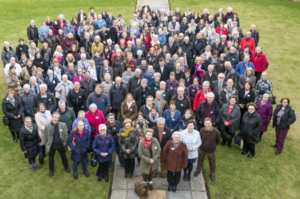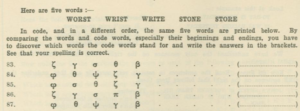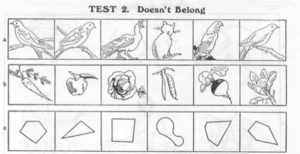Lessons from the past, guides for the future
This picture was taken at a get-together on 20th February 2016. I am about four rows from the front standing next to a classmate from primary school in a bright red jacket. We hadn’t seen each other since I left school. The event? A reunion of members of the Aberdeen Children of the Nineteen Fifties, ACONF for short. We were amongst the 350 or so who attended. I met up with other classmates I hadn’t seen since I left the Aberdeen Grammar School. That was at the tender and naïve age of just 17 when I headed off to Edinburgh University.
I also gave a talk at the meeting about Generation Scotland, because the previous year we had invited ACONF members to join. They did so enthusiastically in what was our most ambitious ‘add on’ study to date. It meant a clinic visit and lots of questions about general and mental health, thinking skills and memory, and a brain scan. Click the links below to see some of our research findings.
Long-term inflammation may hold a key to understanding depression
STRADL – Stratifying Resilience and Depression Longitudinally
The ACONF study is remarkable. This city-wide study has followed the lives of children from early post WWII and the birth the NHS to the present. During that time, Aberdeen has changed dramatically from one of the largest fishing ports to the epicentre of the North Sea oil industry. It’s now reinventing itself for the carbon-neutral future we must all aspire too. It’s not all been plain sailing though. Indeed, Aberdeen has a tale to tell that is highly relevant today.
This past year, we have all witnessed the toughest of all public health crises. Mistakes have been made along the way. In the UK, that’s in part through a lack of anticipation and preparation on top of the depleted state of the NHS entering the pandemic. A public enquiry has been promised. It will take longer to unravel what was done well and what was not than for the pandemic itself to be over.
The public enquiry must also look to lessons from the past and not just previous coronavirus outbreaks that barely touched our shores or even the devastating Spanish flu epidemic that took its toll during and after WWI. On a much smaller scale, we have a comparison to make and lessons to learn from the typhoid epidemic that hit Aberdeen in 1964.

Typhoid fever is a life-threatening infection caused by the bacterium Salmonella Typhi. It is usually spread through contaminated food or water. According to the WHO, up to 20 million people get sick from typhoid and between 128,000 and 161,000 people die from it every year. That more or less equates to the UK death toll from Covid-19 this past year. Typhoid symptoms include prolonged fever, fatigue, headache, nausea, abdominal pain, and constipation or diarrhoea. Like Covid-19, typhoid has a long recovery time, even for those only mildly affected at first. Like Covid-19, vaccines have come to the rescue, but we are only safe when everyone is safe.
Two cases of typhoid were diagnosed in Aberdeen on 20th May, 1964. The Aberdeen epidemic was traced back to one grocer shop and single tin of contaminated corned beef shipped from Argentina. It was one of a large batch purchased by the Government in the early 1950’s. Much later, it was released to the wholesale market to cover a national shortage of meat. Less than 500 Aberdonians were infected and few died, but typhoid is a protracted illness with a slow recovery. The city hospitals were overwhelmed. Like Covid-19, patients, including many children, had to be kept isolated and could not be visited by parents. Anyone not living in Aberdeen was encouraged to stay away. Like Covid-19, schools were closed. But the outbreak was short and sharp thanks to rapid implementation of an aggressive public health strategy to track down and isolate possible cases and strong advice on measures to stop the spread. Like Covid-19, hand washing and minimising contact with others became the golden rule. Like Covid-19, there were daily bulletins and, for the first time ever, there was intense television coverage and extra programming for school children when the schools closed.
Ironically, Dr Ian MacQueen, the Medical Officer of Health in Aberdeen, came in for Westminster criticism for ‘over-reacting’. However, his strategy made it possible to declare an ‘all clear’ only 28 days after the initial cases were identified. Sadly, there were long-term health consequences on those infected. The city of Aberdeen also suffered long-term economic consequences. In those days, Aberdeen was a favourite holiday destination for the summer trades fortnight. It promoted itself as “The Silver City with the Golden Sands”. From being a thriving and prosperous city, Aberdeen entered the doldrums until the discovery of North Sea oil and gas. 
I don’t think I suffered much from a few weeks off school. A year later, I seemed to do alright in my 11+ exam. I actually quite enjoyed the extra test I was given as part of the ACONF study. Here are a couple of the original learning and memory tests.

I am sure that much more is still to come from this partnership between ACONF and Generation Scotland. Already, ACONF members have taken part in our CovidLife surveys. When we restart recruitment to Generation Scotland after the summer holidays, we really hope more ACONF members, their children and grandchildren will choose to take part. If you wish, you can register your interest in joining Generation Scotland using the link below.




Recent comments